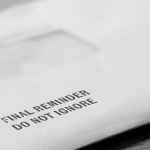Late payments continue to be a persistent threat to cash flow for UK businesses. Despite efforts to legislate against this, many companies still struggle to get paid on time. This blog explores the key legal and practical steps creditors should prioritise in 2025 to strengthen their position and effectively recover commercial debts.
Enforce your credit terms
Many late payments result from unclear or weak payment terms. A well-drafted contract should specify precise payment deadlines, late payment interest rates (under the Late Payment of Commercial Debts (Interest) Act 1998, currently 8% above the base rate), and procedures for handling disputed invoices. Consistent enforcement of these terms is crucial. Businesses should confidently impose late payment interest and debt recovery charges where necessary.
Be proactive
A frequent mistake is assuming that silence implies agreement. Proactive credit control involves sending regular reminders before and after the due date, quickly escalating to a dedicated collections team or external solicitor, and having a written process to determine when a debt is formally overdue. Time is critical – the older the debt, the less likely it is to be recovered in full.
Use Statutory Demands where appropriate
If a company owes you at least £750, a statutory demand can be an effective tool. It gives the debtor 21 days to pay or face potential liquidation actions. However, statutory demands should not be used to unlawfully pressure payment of genuinely disputed debts. Misusing this tactic can lead to cost penalties or claims for abuse of process.
See if any personal guarantees exist
For debts owed by a limited company, directors are usually shielded from personal liability unless a personal guarantee was signed. In this case, the creditor can pursue the director personally. Make sure to verify whether the guarantee is enforceable, if a notice of default has been served (if required), and if the guarantor has any assets worth pursuing. This approach can significantly influence negotiations.
Don’t delay issuing a Letter Before Action
Before initiating court proceedings, a Letter Before Action (LBA) is typically required. This letter should clearly detail the amount owed, a payment deadline (usually 14 days), and the next steps, which may include court action or insolvency proceedings. An effective LBA often prompts payment, avoiding litigation.
Understand the small claims track
Claims under £10,000 are handled on the small claims track. These cases are cheaper and quicker, but legal costs aren’t typically recoverable. As a result, solicitors can’t work on a no-win-no-fee basis, and legal fees can surpass the debt if not managed carefully. Consider having a solicitor prepare documents while you represent yourself in hearings to save costs.
Know when to escalate the debt to court proceedings
For larger debts or persistent non-payment, litigation might be necessary. Make sure the debt is well-documented, you have proof of supply and non-payment, and you’ve adhered to the Pre-Action Protocol for debt claims (particularly if the debtor is an individual or sole trader). Judgments can be enforced through High Court Enforcement Officers, charging orders, or third-party debt orders.
Use Winding-Up Proceedings with caution
If a company refuses to pay, and there are no genuine disputes, creditors can issue a winding-up petition. This forces the debtor to act – either pay up or face liquidation. However, use insolvency proceedings with caution. If you’re one of many creditors, you may not recover much, so strategy and legal advice are essential.
How Debt-Claims.com Assists Commercial Creditors
Debt-Claims.com provides a solicitor-led, fully digital solution for commercial creditors looking to recover unpaid debts efficiently and without delay.
The platform offers:
- A streamlined system to issue Letters Before Action, statutory demands, and County Court claims
- Clear, fixed pricing with no unexpected charges
- Direct communication with experienced debt recovery solicitors
- Integration with High Court enforcement for eligible cases
- Tools to monitor and manage each stage of the recovery process in real time
By combining legal oversight with automation, Debt-Claims.com helps businesses recover outstanding debts while meeting all relevant procedural and regulatory requirements. Whether you’re dealing with a single overdue invoice or handling a large number of claims, the service is built to simplify the legal recovery process and reduce overall cost.
Final words
In 2025, creditors must act swiftly and precisely. Clearly defined contract terms, effective credit control, and timely legal action are crucial. Relying on polite reminders and prolonged timelines will only put you at the back of the queue. Prioritise your position early – or risk writing off the debt entirely.


